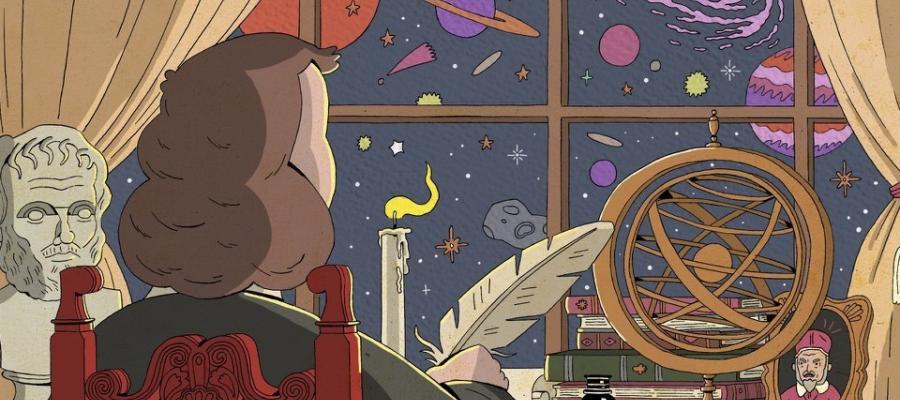Philosophy Talk and the Ignorant NEH Panelist: A Rant!
23
Mar 2009
I don't usually rant. I fancy myself a calm deliberate guy. Not only do I play a dispassionate voice of reason on the radio, I really do try to be a dispassionate voice of reason in my every day life. I don't always succeed mind you. But at least my heart's in the right place. But I've got to get something off my chest. And what better place to do that than on a blog. I wish I could do it anonymously, like so many do. But I don't think that would work here. So what's my beef? It has to do with Philosophy Talk and the National Endowment for the Humanities. In general, i don't...
Read moreA Comic Book for 17th-Century Philosophy
07
Feb 2018
Interested in learning more about 17th-century philosophy, but from a graphic novel? Father-son duo Steven Nadler, a professor of philosophy at the University of Wisconsin, and Ben Nadler, an illustrator, co-authored Heretics!—a graphic novel that explains the history of philosophy during this period. If you need a quick brush-up or fun introduction to Copernicanism or René Descartes's dualism, the Nadlers have made 17th-century scholarship accessible to a broad audience. Check out a chapter from Heretics! (courtesy of The Atlantic) here:...
Read moreMay the Fourth Be With You
04
May 2018
In honor of 5/4, Star Wars Day, we're taking a deeper look at the paradox of the Force in Star Wars. Eduardo Perez, an Assistant Professor of English, examines the paradox of the Force in George Lucas' Star Wars universe. The Force, it is claimed, must be balanced—yet this is not quite the case. The balance of the Force is in direct contradiction to the desire for the good guys to win. Is there a way for the franchise to satisfy both of these pulls? Read more to find out (WARNING: SPOILERS): https://andphilosophy.com/2017/03/13/the-paradox-of-the-force-the-quest-...
Read moreStruggles of Democracy
28
Jun 2016
Like most words for powerful ideas, “democracy,” is a bit ambiguous, a bit blurry around the edges; the word itself is a contested item in our democracy and others. It would help if we have a preliminary definition. I like Lincoln’s. “Government of the people, by the people, and for the people.” But now we have to ask what that means. Here’s my take on it. Government of the people means that all the people are subject to the laws; the rights don’t just apply to the rich or noble; the duties don’t just fall on the poor and hard-working....
Read moreThe Last "Universal Genius"
13
Aug 2015
Leibniz was a very practical philosopher. One could argue that he has as much or more practical impact on Silicon Valley as any philosopher. He invented binary arithmetic; without that, no computer science! Plus a lot of other ideas along the same lines. He was arguably the inventor of computer science. He made great advances in logic. He anticipated Turing machines. He invented a device for mechanically doing arithmetic operations that was the basis of most calculating devices until digital calculators came along. He also invented or...
Read moreIntergenerational Obligations and the Rope of Lives
07
Jun 2005
Yesterday on the show, John came up with a really nice metaphor. He compared a generation to a small strand in a long rope. Each strand is closely intertwined with a number of other nearby strands, but mostly the strands don’t make direct contact with each other. If you think of the rope as growing over time, the metaphor captures a very nice fact about relationships among the generations. No one strand lasts very long, for example. But the rope endures by having new strands begin where other strands have left off. I like...
Read more#FrancisOnFilm: Sundance - It's a Wrap!
02
Feb 2017
In the last three days of Sundance, I was fortunate enough to see a few more movies worth looking out for. The first four below haven’t reportedly been sold for distribution, but you may be able to catch parts or all of them online. Kuso was Sundance at its most bizarre, even for the Midnight session of the festival. The film was directed by musician Flying Lotus (Steve Ellison), co-written by David Firth and Zach Fox, and features jazz from Kamasi Washington and other Brainfeeder colleagues of Ellison’s. The program guide describes it as “plung[ing] the audience into a magical mix of...
Read moreAnother Reason Zoom Is So Draining
18
Aug 2020
Months into our lockdowns, many of us are becoming intimately familiar with Zoom fatigue. This is the particular dead-eyed, mind-numbing exhaustion I feel at the end of pretty much every video meeting I’ve ever attended. Recently the Internet has exploded with reasons Zoom exhausts you more than in-person interaction. For example: you can’t make eye contact properly; you miss non-verbal signals that help you talk in turn and read emotions; you are constantly switching your attention between different faces, voices, and messages; you can’t stop staring at your...
Read moreWhy Read Proust in 2022?
11
Nov 2022
This essay also appears at the website of Oxford University Press, publisher of Josh's new book,
"The World According to Proust."
The world is literally on fire; authoritarianism threatens multiple countries; racism and xenophobia are rampant; women’s and LGBTQ rights are under threat—why on earth would anyone spend time reading a 3,000-page novel by a man who’s been dead (exactly) a hundred years?
Well, there’s at least some politics in Proust’s novel. The longest sentence—stretching over three full pages—is a lament...
[VIDEO] What is Neoliberalism?
17
Mar 2017
"Neoliberalism" is one of those terms tossed around by both those who know what they're talking about and those who have absolutely no idea. It certainly feels good to say, whether in derision or in earnest deployment, and it's also something powerfully descriptive. But like any other complex concept, the definition of neoliberalism is often in contestation. As the Stanford anthropologist James Ferguson wrote in his essay, "Uses of Neoliberalism," there is this "huge variation" in the way that the term is used. But he offers some helpful pointers: In perhaps the strictest...
How is the Internet Changing Friendships?
20
Jul 2017
How, if at all, is the internet changing the nature of friendships? Does social media strengthen friendships or make them more shallow? According to this video from The Atlantic, social media helps to preserve friendships that would have otherwise died out. By ensuring us constant access to our friends—"commemorative" ones that we have fond memories of but have not talked to in years, old friends that we marginally keep in touch with, and current friends we often contact—social media serves an important tool for the kind of "maintenance" all friendships require. Of...
Read moreThe Philosophy of Humor (And the Humor of Philosophy)
03
Nov 2014
A skeleton walks into a bar. It says, “Give me a beer and a mop.” That’s my idea of a great joke. It’s short. The first line creates a vivid image. Then with nothing further you get the punchline. It takes most people a couple of seconds to get it; the clearer the initial image, the sooner one starts laughing. Or groaning. But some people hate this joke. Not subtle. Not cerebral. No one has yet told me it is offensive to skeletons, but that’s just a matter of time. Here is another of my favorites. A man walks into a deserted bar. That’s fine with him; he wants to be alone. He asks...
Read moreMind Reading
07
Apr 2012
Before people think we’ve gone off the deep end, we should explain that by Mind Reading, we don’t mean anything having to do with the paranormal or the occult. We’re talking about the way human beings can be really good at understanding each other, the way we figure out what other people believe, desire, or intend. It’s this perfectly ordinary skill -- the basis and significance of which we want to explore today. Our capacity for mind-reading is actually a big deal -- a major evolutionary achievement of our species. Without it, we couldn’t learn from each other as easily...
Read moreThe Philosophy of Westworld
27
Sep 2018
(Warning: spoilers!)At first glance, Westworld is just another show about robots run amok—a simple remake of the 1973 Westworld movie, a new Terminator, or at best a twenty-first-century I, Robot. It appears to be solely interested in Frankenstein-style questions about people creating technology that no-one can control, and in Blade-Runner-style questions about artificial life forms evolving into creatures like us, with as much—or as little—autonomy, self-understanding, and feeling as we have. If you look a little closer,...
Read moreThe Appeal of Authoritarianism
07
Oct 2019
Why do some people find authoritarian leaders appealing? Why do they sometimes secure vast numbers of votes in democratic countries? These are some of the questions we’re asking in this week’s show. Authoritarian leaders tend to corrupt the political system, rig the courts, assail the free press, jail their opponents, constrain or close universities, and lie brazenly to their citizens. They pit social groups against one another, depicting some as “real Americans” (say) and others as interlopers and/or exploiters. It’s hard to imagine what any fully rational voter could see in...
Read moreWhat are Human Rights?
25
Jun 2010
Our question this week is “What are human rights?” The American declaration of independence offers a compelling answer to that question so its the first place one might think to look of for a characterization of human rights. It says in what I personally find stirring language that “All men are created equal … they are endowed by their Creator with certain unalienable Rights … among these are Life, Liberty and the pursuit of Happiness.” The Declaration is rooted in the Enlightenment idea that every human being enjoys, just in virtue of being a human being,...
Read moreFeminism and Philosophy's Future
21
Nov 2017
Male philosophers may think feminist philosophy has nothing to offer them. Yet feminist philosophy has already enriched analytic philosophy and promises to deepen philosophers' "serious engagement" with continental thinkers, argues Gary Gutting in this article from The Stone. Feminist philosophy, he writes, is much more than a political movement in this regard. To give an earlier example in history, Gutting reminds readers that anayltic philosophy dominated in the philosophical establishment in the 1970s and 80s. "The pluralists" of philosophy though, comprised of pragmatists, metaphysicians...
Read moreCheck us out Wednesday and Thursday in Portland
17
Jun 2007
Be sure to check out the Philosophy Talk team this week in Portland. We'll be doing two events. On Wednesday, June 20th, we'll do a live taping a Powell's City of Books on Burnside. The show starts at 7:30. Our guest will be poet and philosopher Troy Jollimore, winner of the National Book Critics Circle Award in Poetry for his collection of poems Tom Thomson in Purgatory. Come and be part of the audience. After the show, Troy will be signing copies of his very fine book. Plus you can meet and greet the entire Philosophy Talk team. We're really looking forward to it. Some come on over to...
Read moreStories To Think With
07
Mar 2018
Philosophers are notorious for expressing themselves in a dry and, let’s face it, boring way. The guiding ideals for most philosophical writing are precision, clarity, logical rigor, and the sort of conceptual analysis that leaves no hair un-split. And even those philosophers who are fine literary stylists rarely stray very far from the analytical straight-and-narrow. I’ve got nothing against clarity, precision, and the like—but this isn’t the only way to do philosophy. Outside the academic journals, profound philosophical ideas are often expressed through literature, cinema, and song. There’...
Read moreSartre's Existentialism
13
Jan 2016
Jean-Paul Sartre was one of my favorites when I was an undergraduate. I enjoyed his novels and plays, and his great essay “Existentialism as Humanism. “ And I once even read a good bit of Being and Nothingness, his 700 page magnum opus. So what did Sartre mean by saying that we are radically free, and that we are condemned to be free? And what is existentialism? This morning I made the decision to come to work on Philosophy Talk, rather than turn over and go back to sleep. Now I couldn't’ decide to change the past --- say go back and change the...
Read moreLife and Death in Prison
07
Jan 2016
Because of some very harsh mandatory minimum sentencing laws, the U.S. incarcerates a huge number of people, many of whom are serving life without the possibility of parole. This country now has about one quarter of the world’s prison population, which is remarkable, if you consider that we’re not even 5% of the total world population. And our prison population is also rapidly aging, which means that it’s a population with more and more health issues. Of course, prisoners don’t exactly get the best healthcare in the world. So, many end up dying in terror, alone in their cells, from...
Read moreWhy Philosophize?
05
Mar 2015
Recently, at a conference in Las Vegas, I was looking out my 29th floor window at the desert and some mountains. A storm was moving slowly toward the North. There was a clear patch over a large park, but the storm would soon be there and the impending deluge was quite apparent. I thought about how different this was from our usual experience of weather, on the ground. If we see a sunny sky, we might pack up some food and take the family for a picnic. When dark clouds "suddenly" appear out of nowhere and pelt us with heavy rain, we might be upset. Weather might seem cruel and capricious,...
Read moreNot so deep thoughts about humor
27
Feb 2006
Why do birds fly? Because they don't like to walk. That was a joke made up by my granddaughter Erin when she was three. She had learned the form of one kind of joke, without quite mastering the part about being funny. She made up jokes non-stop for about three hours, most of them even less funny than the above, regaling those trapped in the car with her, while turning blue from laughing so hard at them herself. It probably wouldn't be that hard to program a computer to do as well as Erin did. If it spit out enough two-liners, maybe some of them would be funny....
Read moreThe Experience of Beautiful Things
08
Mar 2005
Since lots of beautiful things don't have skin, whoever first said that beauty is only skin deep was clearly mistaken. When I was a kid, by the way, we used to continue "...but ugliness is to the bone." Of course, the speaker was probably being metaphorical. Perhaps he or she was trying to say that beauty is the least of the virtues that a thing can have. But is it really an apt metaphor? Perhaps we can answer by applying the implied standard to the metaphor itself. A "skin deep" metaphor would, I suppose, not be ...
Read moreNonduality
05
Jun 2021
What does it mean to say everything is one? Doesn’t it seem like the world is full of many different things? Or is separateness just an illusion? This week we’re thinking about Nonduality and the Oneness of Being. Lots of philosophers, from both Eastern and Western traditions, have made claims about the oneness of being. But for this week's show, we’re mostly focusing on nondualist philosophy from the Hindu Vedic tradition. Even within that tradition, there are many different schools of thought with different understandings of oneness, so it can be a bit confusing for the novice. The school...
Read more
















